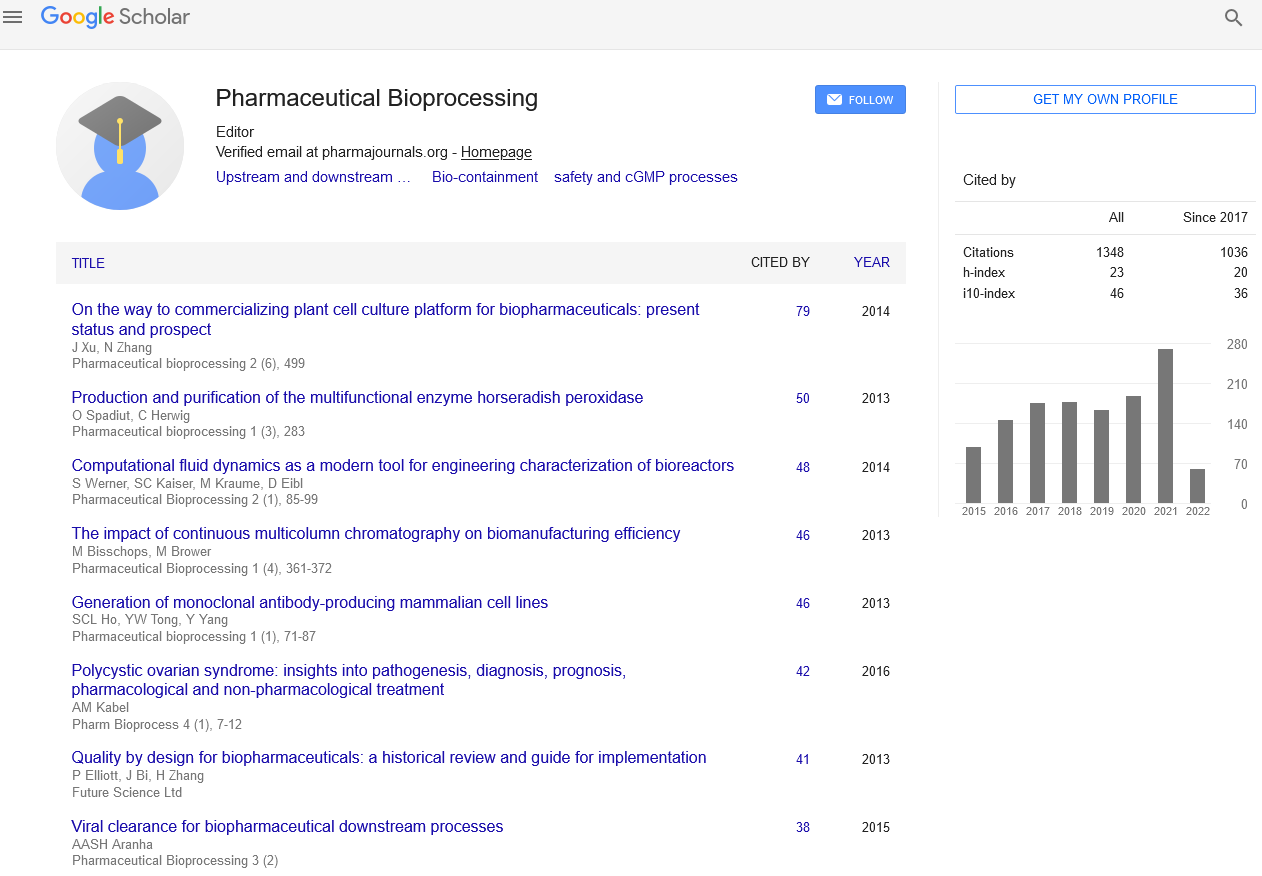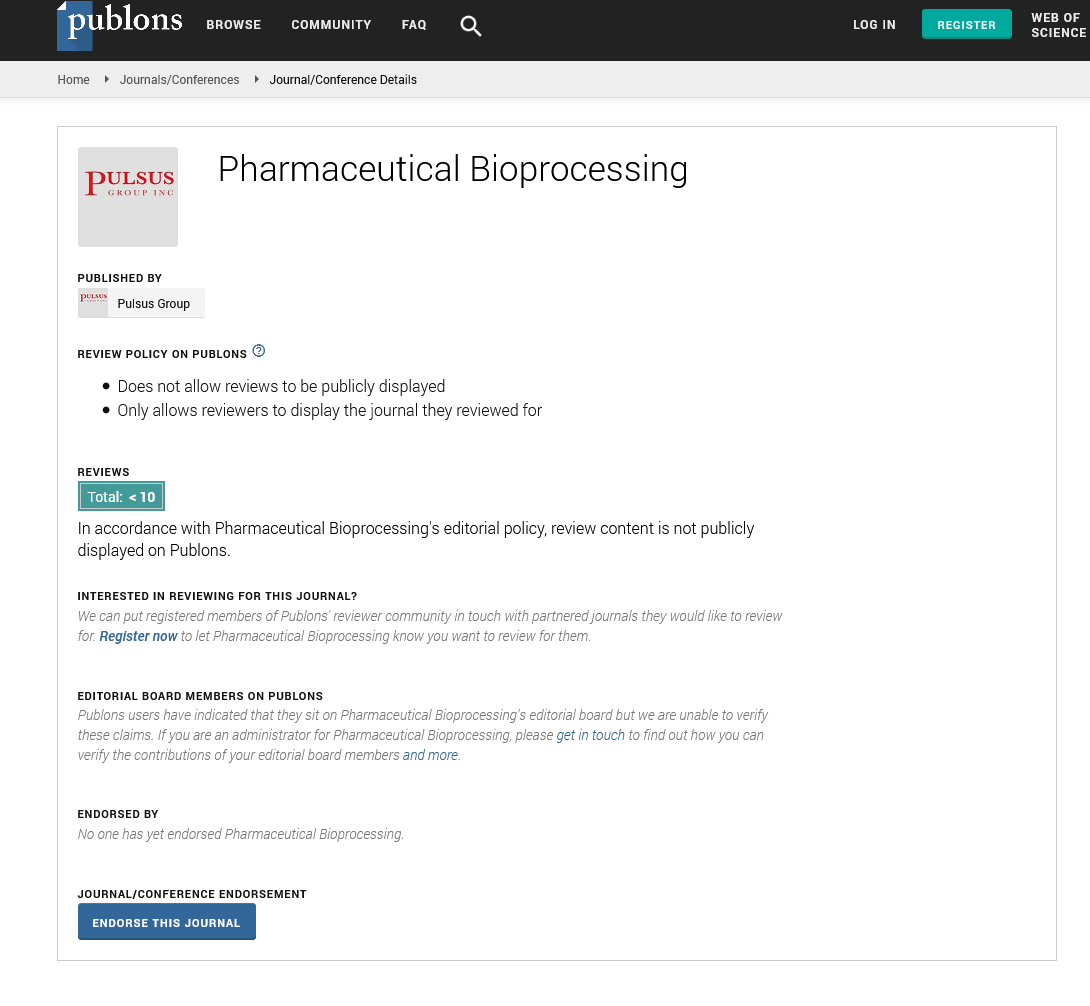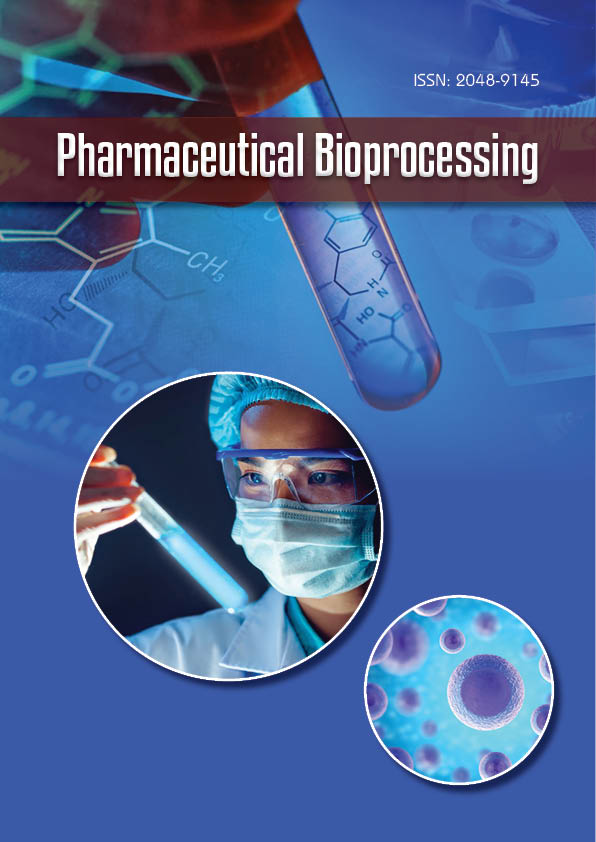Perspective - Pharmaceutical Bioprocessing (2024) Volume 12, Issue 3
The Evolution of Pharmaceuticals: From Ancient Remedies to Modern Marvels
- Corresponding Author:
- Alexa Jouss
Department of Pharmacy,
University of Yaroma,
Zarqa,
Jordan
E-mail: alexjouss@blossom-tech.nl
Received: 04-May-2024, Manuscript No. FMPB-24-134020; Editor assigned: 08-May-2024, PreQC No. FMPB-24-134020 (PQ); Reviewed: 22-May-2024, QC No. FMPB-24-134020; Revised: 07-Jun-2024, Manuscript No. FMPB-24-134020 (R); Published: 14-Jun-2024, DOI: 10.37532/2048-9145.2024.12(3).180-181
Introduction
Pharmaceuticals, the cornerstone of modern medicine, have a rich history dating back thousands of years. From ancient herbal remedies to cutting-edge biotechnology, the journey of pharmaceuticals is a testament to human ingenuity and our relentless pursuit of better health outcomes. In this article, we’ll explore the evolution of pharmaceuticals, from their humble beginnings to the complex industry that shapes our healthcare landscape today.
Description
Ancient origins: Herbal remedies and alchemy
The roots of pharmaceuticals can be traced back to ancient civilizations such as Egypt, Mesopotamia, China, and India. These cultures relied on herbal remedies and natural substances to treat various ailments and diseases. Plants like aloe vera, garlic, and opium poppy were among the many botanical sources used for medicinal purposes.
In ancient Greece, the father of medicine, Hippocrates, emphasized the importance of diet, exercise, and natural remedies in maintaining health. His holistic approach laid the foundation for the practice of medicine for centuries to come. During the middle ages, the practice of alchemy flourished in Europe. Alchemists sought to transform base metals into gold but also delved into the realm of medicine, experimenting with various substances and concoctions in search of the elixir of life. While their pursuits may have been more mystical than scientific, they contributed to the early understanding of chemistry and pharmacology.
The birth of modern pharmacology
The dawn of the Renaissance brought about a renewed interest in science and exploration, leading to significant advancements in medicine and pharmacology. One of the key figures of this period was Paracelsus, a Swiss physician who rejected the mystical notions of alchemy and emphasized the use of chemical substances in medicine. He is often regarded as the father of modern pharmacology for his pioneering work in pharmacotherapy.
The 19th century saw the emergence of organic chemistry, which revolutionized the field of pharmacology. Chemists began isolating and synthesizing active compounds from natural sources, laying the groundwork for the development of modern drugs.
The pharmaceutical industry takes shape
The late 19th and early 20th centuries witnessed the rapid growth of the pharmaceutical industry, driven by advancements in chemistry, manufacturing, and medicine. Companies like Merck, Bayer, and Pfizer became household names, producing a wide range of drugs to treat everything from infections to chronic conditions.
The discovery of antibiotics, starting with Alexander Fleming’s penicillin in 1928, revolutionized the treatment of bacterial infections and saved countless lives. This breakthrough paved the way for the development of other antibiotics, ushering in the era of modern medicine.
The mid-20th century saw further innovation with the development of vaccines, steroids, and psychotropic drugs. Vaccines like the polio vaccine virtually eradicated once-deadly diseases, while steroids revolutionized the treatment of inflammatory conditions such as asthma and arthritis. Psychotropic drugs like chlorpromazine transformed the management of mental illness, offering hope to millions of patients suffering from conditions like schizophrenia and bipolar disorder.
The rise of biotechnology
The latter half of the 20th century witnessed another revolution in pharmaceuticals with the rise of biotechnology. Biotech companies began harnessing the power of living organisms, such as bacteria and yeast, to produce therapeutic proteins and other complex molecules.
One of the most notable achievements of biotechnology was the development of recombinant DNA technology, which allowed scientists to manipulate and engineer genes for various purposes. This technology paved the way for the production of insulin, human growth hormone, and other life-saving biologics.
The advent of monoclonal antibodies further expanded the therapeutic arsenal, offering targeted treatments for cancer, autoimmune diseases, and other conditions. Drugs like trastuzumab (Herceptin) and infliximab (Remicade) have revolutionized the treatment of breast cancer and rheumatoid arthritis, respectively, improving patient outcomes and quality of life.
Challenges and opportunities in modern pharmaceutical development
While the pharmaceutical industry has made remarkable strides over the centuries, it also faces numerous challenges in the 21st century. Rising healthcare costs, regulatory hurdles, and ethical concerns surrounding drug pricing and access are just a few of the issues confronting the industry.
Moreover, the emergence of drug-resistant pathogens poses a significant threat to public health, underscoring the need for continued innovation in antibiotic development. Additionally, the opioid epidemic has highlighted the dangers of overprescribing and the need for more effective pain management strategies. Despite these challenges, the future of pharmaceuticals is bright, with exciting advancements on the horizon. Technologies like CRISPR gene editing hold the promise of curing genetic diseases, while artificial intelligence and machine learning are revolutionizing drug discovery and development processes.
Conclusion
In conclusion, the evolution of pharmaceuticals is a testament to human ingenuity and our relentless quest for better health outcomes. From ancient herbal remedies to cutting-edge biotechnology, the journey of pharmaceuticals has transformed the practice of medicine and saved countless lives. As we continue to push the boundaries of science and innovation, the future holds immense promise for the development of new treatments and cures that will improve the lives of people around the world.


